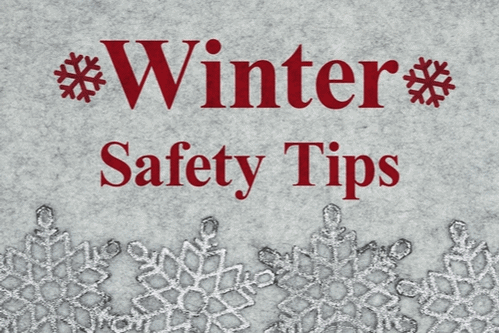Let It Snow, Let It, Snow, Let It Snow….at the North Pole!
But, unfortunately, it will also snow in Cleveland. Seniors need to be especially careful because they run a high risk of feelings of isolation, flu, COVID, cold germs, and weather-related injuries like hypothermia, frostbite, and falls.
We, at Kabb Law, have put together a list of senior winter tips to help keep you safe.
Winter Safety Tips For Golden Agers
1. Avoid Icey Surfaces:
The risk of falling is higher in the winter than at any other time of the year, which is why this is number one of our winter safety tips.
When going outside, try to avoid slippery surfaces, wear boots with good traction and non-skid soles, replace worn cane tips, and try to stay on cleared salted sidewalks. When you get home, don’t walk around in your wet boots. The snow that has clung to the bottom is slippery and dangerous. Young people can recover quickly from falls, but seniors often face complications from falls. According to Dr. Stanley Wang at Stanford Hospital, “Complications from falls is the leading cause of death from injury in men and women over the age of 65.”
2. Fight Wintertime Depression:
Because there is less contact with others during the winter months, seniors tend to feel lonely and isolated. Family members should make it a habit to check on seniors with short daily phone calls. Also, involve neighbors and friends in a “check-in” system. The seniors should reach out to someone the moment they are feeling down. Calls to out-of-town children or grandchildren are great mood-boosters and can make an enormous difference.
3. Dress for Warmth Inside and Outside the Home:
Because we lose body heat as we age, it is important to dress warmly. According to the CDC, more than half of hypothermia-related deaths were of people over the age of 65. Be sure to dress in layers, wear a warm scarf around your neck, warm socks, warm gloves, and a warm jacket or coat that is waterproof.
Avoid hyperthermia even when you’re inside. Don’t let your body temperature go below 95 degrees. Heat your living areas as best as you can. Close the vents in rooms that you are not using. Prevent drafts from coming in under doors and around windows. If necessary, block these drafts with towels. Dress warmly and keep blankets and throws nearby in case there is a power outage.
4. Prepare for Power Outages:
The same snow that looks beautiful from your window could also be the cause of downed power lines. Be prepared.
Purchasing a portable generator can be pricey, but a great option if you can afford it. If not, wear several layers of clothing, have flashlights with fresh batteries in an easy-to-reach location along with a first aid kit, necessary meds, extra cash, warm blankets, bottled water, and non-perishable foods such as canned vegetables, tuna, and soups.
5. Avoid Carbon Monoxide Poisoning:
Check the batteries in your carbon monoxide detector. Remember that fireplaces, gas heaters, and lanterns can lead to carbon monoxide poisoning, and electric space heaters can increase the risk of fire.
6. Be Careful with Your Diet:
Nutrition is especially important during the winter months because good nutrition promotes brain health, strengthens the immune system, prevents unplanned weight gain or loss, helps in maintaining the proper body temperature, and can help fight depression. Vitamin D deficiency is very common during the winter months. Make it a point to eat foods like salmon, tuna, milk, and grains.
We’re Here For You
At Kabb Law we understand the importance of safety and socialization for older adults who may feel stranded at home. Call our social worker at 216-991-5222 for some additional winter safety tips for you and your loved one’s safety.

